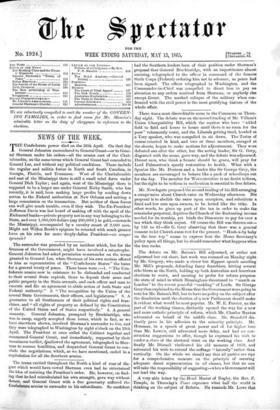The surrender was preceded by an incident which, but for
the firmness of the Government, might have involved a catastrophe. General Johnston had asked permission to surrender on the terms granted to General Lee, when Sherman of his own motion offered to him as representative of the "Confederate States" the bases for a general treaty of peace. These bases were :-1. "The Con- federate armies now in existence to be disbanded and conducted to their several State capitals, there to deposit their arms and public property in the State arsenals, and each officer and man to execute and file an agreement to abide action of both State and Federal authority." 2. "The recognition by the Union of the several State Governments, their officers, and legislatures." 3. A guarantee to all Southerners of their political rights and fran- chises, and "all rights of property as defined by the Constitution of the United States and of States respectively." 4. A general amnesty. General Johnston, prompted by Breckinridge, who was in camp, eagerly accepted these terms, which in fact, as we have elsewhere shown, involved Sherman's surrender to him, and they were telegraphed to Washington by eight o'clock on the 19th April. The President at once called the Cabinet together and summoned General Grant, and immediately, supported by their unanimous verdict, clisalloaved the agreement, telegraphed to Sher- man to resume hostilities, and despatched General Grant to con- clude the negotiations, which, as we have mentioned, ended in a capitulation for all the Southern armies.






























